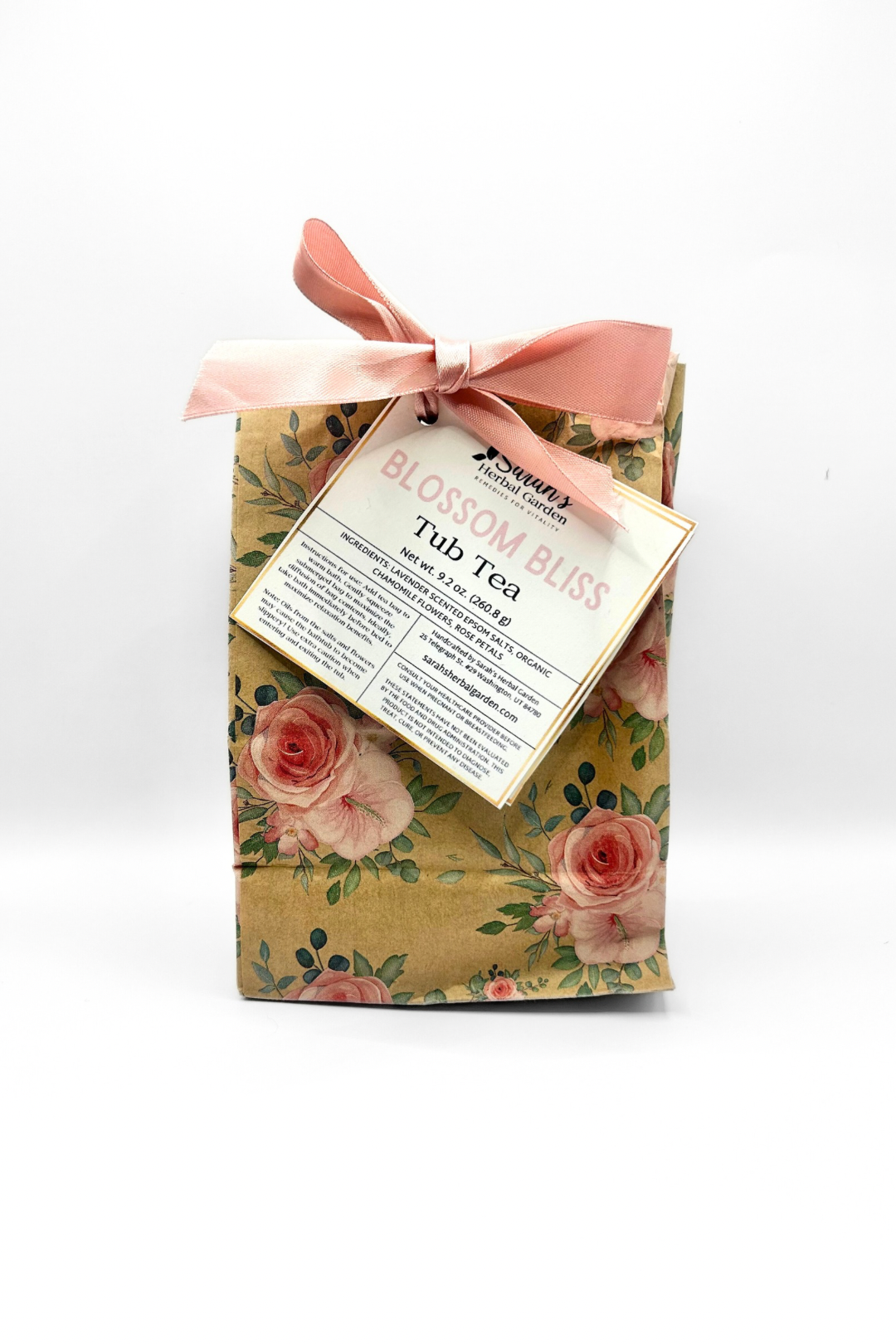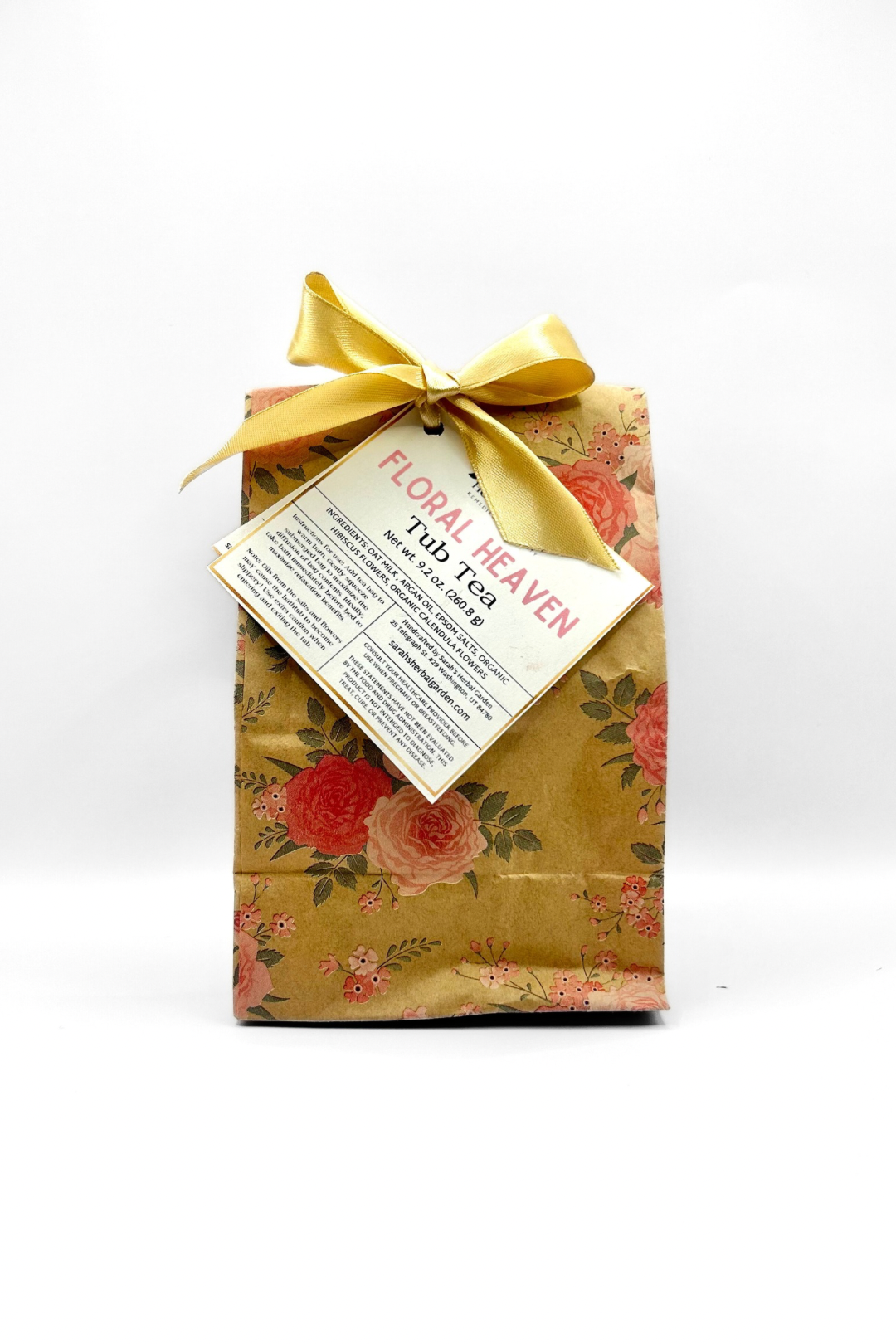Sarah's Herbal Garden
Herbal Tub Tea
Herbal Tub Tea
Couldn't load pickup availability
9.2 oz. (260.8 g) For external use.
Treat yourself or someone you know to a comforting and nourishing bath experience!
It's like herbal tea, but for the bathtub! The combination of epsom salts and aromatic floral herbs will be like HEAVEN for your senses! In addition to the pleasant aroma, epsom salts and herbal flowers offer many benefits to the skin and body as a whole. Epsom salts replenish minerals through the pours, bringing muscle relaxation and mental clarity. Flower petals reduce inflammation, hydrate and tone the skin, improve circulation, promote healing, and more!
Instructions for use: Add tea bag to warm bath. Gently squeeze submerged bag to maximize diffusion of bag contents. Ideally, take bath immediately before bed to maximize relaxation benefits.
*Note, oils from the salts and flowers may cause the bathtub to become slippery! Use extra caution when entering or exiting the tub.
These statements have not been evaluated by the Food and Drug Administration. This product is not intended to diagnose, treat, cure, or prevent any disease. Consult with healthcare provider if pregnant or breastfeeding, have any underlying health conditions, beginning an herbal supplement for the first time, or are taking other medications.
Share


Ingredients

Epsom Salts
Muscle Relaxation: Epsom salts are widely known for their ability to relax muscles and relieve pain. The magnesium in Epsom salts helps to reduce inflammation and improve muscle function.
Stress Relief: Soaking in an Epsom salt bath can help reduce stress and promote relaxation. Magnesium is known to increase the production of serotonin, a mood-elevating chemical within the brain, creating a feeling of calm and relaxation.
Detoxification: Epsom salts can help draw toxins out of the body. A warm bath with Epsom salts can promote sweating and the elimination of toxins through the skin.
Improved Skin Health: Epsom salts can help exfoliate the skin, remove dead skin cells, and soften rough patches. They may also help with conditions like eczema and psoriasis by reducing inflammation and itching.
Reduction of Swelling and Bruising: The anti-inflammatory properties of Epsom salts can help reduce swelling and alleviate bruises.
Relief from Constipation: When taken internally (under the guidance of a healthcare professional), Epsom salts can act as a laxative to relieve constipation by increasing water in the intestines and promoting bowel movements.
Foot Care: Soaking feet in an Epsom salt bath can help relieve foot pain, reduce odor, and treat fungal infections.
Improved Sleep: The magnesium in Epsom salts can help improve sleep quality by promoting relaxation and reducing stress.
Splinter Removal: Soaking the affected area in Epsom salt water can help draw out splinters and reduce the accompanying inflammation.
Lavender Oil
Anti-inflammatory: Lavender oil has strong anti-inflammatory properties, which can help reduce redness, blotching, and swelling. It can be particularly beneficial for conditions like acne, eczema, and psoriasis.
Antimicrobial: The oil has antimicrobial and antifungal properties, making it effective in combating bacteria and fungi on the skin. This can help prevent and heal infections, including those that cause acne.
Healing: Lavender oil promotes wound healing by stimulating the production of collagen and supporting the growth of new tissue. It can help heal cuts, burns, and other minor skin injuries.
Antioxidant: Lavender oil contains antioxidants that protect the skin from free radicals and environmental damage, which can lead to premature aging and skin deterioration.
Soothing: The calming properties of lavender oil can help soothe irritated and sensitive skin. It can also alleviate symptoms of sunburn, such as pain and redness.
Hydration: Lavender oil helps balance the skin's moisture barrier, providing hydration and preventing dryness and flakiness.
Aromatherapy: The pleasant scent of lavender oil can have a calming and relaxing effect, reducing stress and anxiety, which can positively impact skin health.
Anti-Acne: Due to its antibacterial properties, lavender oil can help prevent and treat acne by killing the bacteria that cause pimples and reducing inflammation associated with breakouts.
Chamomile
Anti-inflammatory: Chamomile is renowned for its powerful anti-inflammatory properties. It can help reduce redness, swelling, and irritation, making it ideal for conditions like eczema, rosacea, and other inflammatory skin issues.
Antioxidant: Chamomile contains antioxidants that help protect the skin from free radical damage caused by environmental factors such as pollution and UV radiation. This protection helps prevent premature aging and skin damage.
Soothing: Chamomile has calming properties that can help soothe irritated and sensitive skin. It can alleviate itching and discomfort associated with various skin conditions.
Healing: Chamomile promotes wound healing by encouraging cell regeneration. It can be beneficial for treating minor cuts, scrapes, and burns, as well as reducing the appearance of scars.
Antibacterial: Chamomile has antibacterial properties that can help prevent and treat bacterial skin infections. This makes it effective in managing acne and other skin issues caused by bacteria.
Moisturizing: Chamomile helps to hydrate and moisturize the skin, keeping it soft and supple. It can be particularly useful for dry and flaky skin.
Lightening: Chamomile can help lighten skin blemishes and hyperpigmentation, promoting a more even skin tone.
Anti-allergenic: Chamomile can help alleviate allergic reactions on the skin, reducing symptoms such as itching and swelling.
Rose Petals
Hydration: Rose petals and rose water are excellent natural hydrators. They help to lock in moisture and keep the skin soft, smooth, and hydrated.
Anti-inflammatory: Rose petals have anti-inflammatory properties that can help reduce redness, swelling, and irritation. This makes them suitable for sensitive and acne-prone skin.
Antioxidant: Roses are rich in antioxidants, which help protect the skin from free radical damage, reducing the signs of aging and promoting a youthful appearance.
Antibacterial: The natural antibacterial properties of roses can help fight acne-causing bacteria and prevent breakouts.
Astringent: Rose petals act as a natural astringent, helping to tighten pores and tone the skin. This can lead to a smoother complexion and reduced appearance of large pores.
Soothing: Roses have calming properties that can help soothe irritated and sensitive skin. They are often used to relieve sunburn and other forms of skin irritation.
Healing: Rose petals can promote wound healing and reduce the appearance of scars and blemishes due to their regenerative properties.
Aromatherapy: The pleasant fragrance of roses has a relaxing and mood-enhancing effect, which can reduce stress and have a positive impact on skin health.
Calendula
A calendula bath, made by infusing water with the petals of the calendula flower (Calendula officinalis), offers numerous benefits for the skin and body. Calendula, also known as pot marigold, is renowned for its soothing, anti-inflammatory, and healing properties. Here’s how a calendula bath can benefit the body:
1. Soothes Skin Irritations and Inflammation
- Calms Skin Conditions: Calendula is known for its anti-inflammatory effects, which can help soothe skin conditions like eczema, psoriasis, and dermatitis. A calendula bath reduces redness, itching, and irritation, making it ideal for people with sensitive or inflamed skin.
- Relieves Itchiness and Discomfort: For conditions like rashes, insect bites, and minor burns, a calendula bath can provide gentle relief from itchiness and discomfort by calming irritated skin.
2. Promotes Skin Healing
- Speeds Up Recovery: Calendula contains compounds that promote cell regeneration, which can help speed up the healing of minor cuts, scrapes, or abrasions. A calendula bath creates an ideal environment for skin recovery by keeping the skin clean and hydrated.
- Supports Wound Healing: With its antibacterial and antiseptic properties, calendula helps prevent infection in minor skin wounds, supporting faster healing.
3. Hydrates and Softens Skin
- Natural Moisturizer: Calendula petals are rich in natural oils that moisturize and soften the skin, making it ideal for people with dry or rough skin. A calendula bath can leave the skin feeling hydrated and refreshed without stripping away natural oils.
- Prevents Dryness: Calendula helps lock in moisture, reducing the dryness that can result from long baths or exposure to water. This is particularly beneficial during colder months when skin tends to be drier.
4. Reduces Muscle Tension and Relieves Soreness
- Eases Aches and Pains: The anti-inflammatory properties of calendula can also benefit sore muscles and joints. A warm calendula bath can help relieve minor aches, making it a relaxing option for people with muscle tension or mild joint discomfort.
- Promotes Relaxation: Calendula has a calming effect on both the skin and the body. Taking a calendula bath can help reduce stress and promote relaxation, providing a moment of comfort and relief for both body and mind.
5. Beneficial for Sensitive and Baby Skin
- Gentle and Safe: Calendula is gentle enough for sensitive skin and is commonly used in baby skincare products. A calendula bath is a safe and soothing way to treat diaper rash or other mild skin irritations in infants and young children.
- Hypoallergenic: Calendula’s soothing, hypoallergenic properties make it suitable for those with delicate skin who may be sensitive to other herbs or essential oils.
6. Helps with Fungal Infections
- Antifungal Properties: Calendula has natural antifungal effects, which can be helpful in treating minor fungal infections, such as athlete’s foot or nail fungus. Soaking in a calendula-infused bath can help keep fungal infections at bay while soothing the affected area.
- Maintains Skin Hygiene: By supporting skin health and keeping the skin clean, a calendula bath can prevent the growth of certain bacteria and fungi on the skin, making it a natural remedy for maintaining overall skin hygiene.
7. Supports Skin’s Natural Barrier Function
- Strengthens Skin Barrier: Calendula helps strengthen the skin’s natural barrier, protecting it from environmental stressors, allergens, and irritants. Regular calendula baths can improve the skin’s resilience and keep it looking healthy.
- Reduces Sensitivity: By enhancing the skin’s natural defenses, calendula helps reduce skin sensitivity and prevent reactions to external irritants, making it a valuable treatment for those prone to skin allergies or sensitivities.
Hibiscus
A hibiscus bath, created by infusing bathwater with hibiscus flowers, offers numerous benefits for the skin and body due to the plant’s rich content of antioxidants, vitamins, and gentle acids. Known for its hydrating, brightening, and anti-inflammatory properties, hibiscus can rejuvenate the skin, soothe irritations, and promote relaxation. Here’s how a hibiscus bath can benefit the body:
1. Brightens and Evens Skin Tone
- Natural Exfoliant: Hibiscus contains alpha-hydroxy acids (AHAs), such as citric and malic acids, which gently exfoliate the skin by removing dead skin cells. This natural exfoliation can lead to a smoother, brighter complexion and an even skin tone.
- Reduces Hyperpigmentation: The natural acids in hibiscus help fade dark spots and discoloration, making the skin look more radiant and reducing the appearance of blemishes and uneven patches.
2. Hydrates and Softens Skin
- Rich in Mucilage: Hibiscus has a high mucilage content, a natural substance that locks in moisture and helps hydrate the skin. A hibiscus bath can leave your skin feeling soft, supple, and deeply moisturized.
- Improves Skin Elasticity: The hydration provided by hibiscus can improve skin elasticity, helping it stay firm and smooth. This moisturizing effect makes it especially beneficial for those with dry or aging skin.
3. Packed with Antioxidants
- Fights Free Radicals: Hibiscus is rich in antioxidants like anthocyanins and vitamin C, which help neutralize free radicals that can damage skin cells and lead to premature aging. Regular use of hibiscus can help protect the skin from environmental stressors.
- Reduces Signs of Aging: By fighting free radicals, hibiscus helps prevent fine lines and wrinkles, giving skin a more youthful and healthy appearance.
4. Soothes Inflammation and Irritations
- Anti-Inflammatory Properties: Hibiscus contains anti-inflammatory compounds that help calm redness, swelling, and irritation. This can be beneficial for individuals with sensitive or reactive skin, as well as those with conditions like eczema or rosacea.
- Relieves Sunburn and Rashes: The cooling and soothing effects of a hibiscus bath can provide relief for sunburned or irritated skin, reducing pain and promoting faster recovery.
5. Promotes Skin Healing
- Encourages Cell Regeneration: The vitamin C and AHAs in hibiscus stimulate cell turnover, which helps the skin repair itself. This promotes healing and can improve the appearance of scars, minor cuts, and blemishes.
- Improves Wound Healing: Hibiscus has mild antibacterial properties that help keep the skin clean, reducing the risk of infection in minor cuts or abrasions and supporting the natural healing process.
6. Balances Oil Production
- Regulates Sebum Levels: Hibiscus can help balance the skin’s oil production, making it beneficial for both dry and oily skin types. Its astringent properties can reduce excess oil, while its hydrating qualities ensure that skin remains moisturized.
- Reduces Breakouts: By balancing oil levels and gently exfoliating the skin, hibiscus helps keep pores clear and reduces the likelihood of acne breakouts, making it a gentle option for maintaining clear skin.
7. Relaxes Muscles and Reduces Stress
- Aromatherapy Benefits: Hibiscus has a mild, pleasant floral scent that can promote relaxation and relieve stress. Soaking in a hibiscus bath provides a calming experience that can soothe both the body and mind, making it ideal for unwinding after a long day.
- Eases Muscle Tension: A warm hibiscus bath can help ease muscle tension and minor aches, providing relief from physical strain and promoting overall relaxation.
8. Helps with Scalp and Hair Health
- Nourishes the Scalp: If you submerge your scalp in a hibiscus bath or use it as a rinse, hibiscus can help soothe dryness and reduce dandruff. Its hydrating and anti-inflammatory properties benefit both the scalp and hair.
- Adds Shine to Hair: The nutrients in hibiscus can enhance hair shine, making hair look healthier and more vibrant. Its high vitamin C content supports collagen production, which can strengthen hair roots and improve hair texture.

